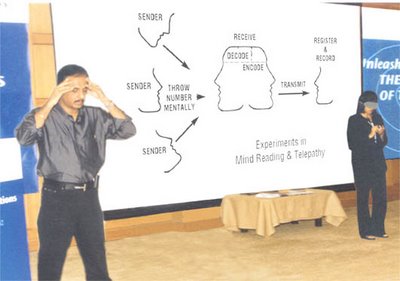Neuroscience
 Mind Reading & Telepathy Experiment in process...
Mind Reading & Telepathy Experiment in process...
...or, I Can See It In Your Eyes.
No, not that kind of "mind reading," but the ability to decode another person's mental state, also called theory of mind. In a study by Domes and colleagues (2006), the neurohormone oxytocin, peddled as the "trust drug" by many shady internet dealers, was administered to male subjects performing a theory of mind task.
[As an aside, nasally administered oxytocin does apparently cross the blood brain barrier designed to keep out foreign agents. I wasn't sure it crossed the BBB, but there you go.]
Anyway, the Reading the Mind in the Eyes task (see Baron Cohen... no, no joking! the OTHER Baron-Cohen) was administered after oxytocin or placebo. The RMET
 Lo and behold, there was a tiny but statistically significant improvement in performance for oxytocin vs. placebo:
Lo and behold, there was a tiny but statistically significant improvement in performance for oxytocin vs. placebo:
1 That's assuming the results from male participants will also hold for females.
- When The Cuddle Hormone Turns Nasty - Oxytocin Linked With Violent Intentions
For many years, the hormone oxytocin was caricatured as the source of all human goodness - trust, altruism, love, and morality. Among the findings that contributed to this picture were the discovery that sniffing oxytocin increases people's trust and generosity in...
- Extras
Eye-catching studies that didn't make the final cut: Babies as young as 14 months show signs of altruism. Psychological factors that predict adjustment and coping in people with multiple sclerosis. Neurotic people spend more time than others looking...
- In Oxytocin We Trust
Oh oxytocin, you cuddly hug drug, you fine upstanding moral molecule, why are you so maligned by critics? That's because you're overrated, and misunderstood by those who look to you as a beacon of empathy, trust, love, peace, and prosperity....
- Paul Zak, Oxytocin Skeptic?
Could a single molecule—one chemical substance—lie at the very center of our moral lives? Research that I have done over the past decade suggests that a chemical messenger called oxytocin accounts for why some people give freely of themselves and...
- Learn To Trust Your Own Eyes
...or so says one of Jenny Holzer's truisms. As an addendum to yesterday's post on Oxytocin and Mind Reading, I present to you the comments of Professor Paul Zak as a public service announcement, sponsored by The Neurocritic: The synthetic oxytocin...
Neuroscience
Oxytocin and Mind Reading...
 Mind Reading & Telepathy Experiment in process...
Mind Reading & Telepathy Experiment in process......or, I Can See It In Your Eyes.
No, not that kind of "mind reading," but the ability to decode another person's mental state, also called theory of mind. In a study by Domes and colleagues (2006), the neurohormone oxytocin, peddled as the "trust drug" by many shady internet dealers, was administered to male subjects performing a theory of mind task.
[As an aside, nasally administered oxytocin does apparently cross the blood brain barrier designed to keep out foreign agents. I wasn't sure it crossed the BBB, but there you go.]
Anyway, the Reading the Mind in the Eyes task (see Baron Cohen... no, no joking! the OTHER Baron-Cohen) was administered after oxytocin or placebo. The RMET
tests a specific facet of mind-reading, that is, inference of the internal state from subtle affective facial expressions rather than mind-reading in general. Because the RMET was originally developed to measure severe impairments in mindreading capability in adults with autism spectrum disorders, we circumvented possible ceiling effects in healthy subjects by dividing the 36 items into two subsets of easy and difficult items.
 Lo and behold, there was a tiny but statistically significant improvement in performance for oxytocin vs. placebo:
Lo and behold, there was a tiny but statistically significant improvement in performance for oxytocin vs. placebo:Compared with placebo, oxytocin improved performance on the RMET in 20 of the 30 participants. This resulted in a significant mean increase of approximately 3% correct responses (mean +/- SD: placebo: 69.4 +/- 8.1; oxytocin: 72.4 +/- 8.6; t=2.18, p=.019, one-sided).But a breakdown of hard-to-read vs. easy-to-read eyes revealed that the benefit was entirely for the former.
Domes G, Heinrichs M, Michel A, Berger C, Herpertz SC. (2006). Oxytocin improves "Mind-Reading" in humans. Biol Psychiatry. Nov 28; [Epub ahead of print]But...but...supposedly women will trust you more after spraying some oxytocin in their vicinity. Now we find out that they'll also be better able to read your mind.1
BACKGROUND: The ability to "read the mind" of other individuals, that is, to infer their mental state by interpreting subtle social cues, is indispensable in human social interaction. The neuropeptide oxytocin plays a central role in social approach behavior in nonhuman mammals. METHODS: In a double-blind, placebo-controlled, within-subject design, 30 healthy male volunteers were tested for their ability to infer the affective mental state of others using the Reading the Mind in the Eyes Test (RMET) after intranasal administration of 24 IU oxytocin. RESULTS: Oxytocin improved performance on the RMET compared with placebo. This effect was pronounced for difficult compared with easy items. CONCLUSIONS: Our data suggest that oxytocin improves the ability to infer the mental state of others from social cues of the eye region. Oxytocin might play a role in the pathogenesis of autism spectrum disorder, which is characterized by severe social impairment.
1 That's assuming the results from male participants will also hold for females.
- When The Cuddle Hormone Turns Nasty - Oxytocin Linked With Violent Intentions
For many years, the hormone oxytocin was caricatured as the source of all human goodness - trust, altruism, love, and morality. Among the findings that contributed to this picture were the discovery that sniffing oxytocin increases people's trust and generosity in...
- Extras
Eye-catching studies that didn't make the final cut: Babies as young as 14 months show signs of altruism. Psychological factors that predict adjustment and coping in people with multiple sclerosis. Neurotic people spend more time than others looking...
- In Oxytocin We Trust
Oh oxytocin, you cuddly hug drug, you fine upstanding moral molecule, why are you so maligned by critics? That's because you're overrated, and misunderstood by those who look to you as a beacon of empathy, trust, love, peace, and prosperity....
- Paul Zak, Oxytocin Skeptic?
Could a single molecule—one chemical substance—lie at the very center of our moral lives? Research that I have done over the past decade suggests that a chemical messenger called oxytocin accounts for why some people give freely of themselves and...
- Learn To Trust Your Own Eyes
...or so says one of Jenny Holzer's truisms. As an addendum to yesterday's post on Oxytocin and Mind Reading, I present to you the comments of Professor Paul Zak as a public service announcement, sponsored by The Neurocritic: The synthetic oxytocin...
